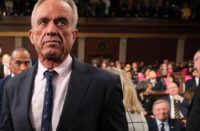The bid by House Republicans to quickly green light a measure that would secure government funding fell short on Thursday night. Unable to secure the two-thirds majority needed for the move, the failure has brought the government one step closer to a potential shutdown.
However, House GOP leaders still have the opportunity to reintroduce the measure via the regular route, which includes sending it to the committee stage. This would allow them to attempt to pass it with a mere simple majority. Dozens of Republicans, however, voted against the measure, with only two Democrats voting in favor. The final vote count was 174 for, 235 against, and one abstaining.
As the deadline looms for the government’s funding to run dry on Friday night, lawmakers are racing against the clock to avoid a shutdown. The bill, intended to keep the government funded through to spring and suspend the national debt limit for two years, requires approval from the Democrat-controlled Senate. However, the White House has indicated that President Biden would not sign the bill.
Steve Scalise, the Republican House Majority Leader, remained optimistic, stating, “We’re going to keep trying, and at some point, the Democrats are going to have to come to the table too,” as he left the Capitol on Thursday night.
The revised deal comprises a three-month extension of government funding, suspension of the debt limit until January 2027, and a provision of $110 billion in disaster aid. It also includes healthcare policy extensions, funds for the reconstruction of Baltimore’s Francis Scott Key Bridge, and a one-year renewal of the farm bill.
Despite the original agreement between House Speaker Mike Johnson and the Democrats falling through due to a GOP revolt spearheaded by President-elect Donald Trump and Elon Musk, Republicans gathered on Capitol Hill on Thursday to devise a new strategy, without any input from the Democrats.
Johnson defended the revised bill on Thursday night, insisting that it still includes some bipartisan measures. He stated that the only change in the legislation was the extension of the debt limit to January 30, 2027.
As the GOP’s discontent over the original resolution grew, President-elect Trump called on Republicans to remove additional spending and instead focus on raising or abolishing the debt ceiling. Trump reiterated his stance on Thursday, stating his preference for the debt ceiling to be scrapped entirely and for certain elements of the proposed spending deal to be removed.
The situation surrounding the funding and the ensuing chaos has led to a barrage of criticism towards Johnson, including from within his own party. With the full House set to vote on the election of a speaker when the new Congress convenes on January 3, Johnson’s leadership is under threat, and his handling of the funding situation could play a significant role in the outcome.
Meanwhile, Democrats have placed the blame squarely on the Republicans for any potential shutdown, accusing them of “detonating” the bipartisan agreement and walking away from the deal. House Minority Leader Hakeem Jeffries insisted that a shutdown can still be avoided if the Republicans stick to the bipartisan agreement.
This article was contributed by Robert Costa, Kathryn Watson, and Alan He.





